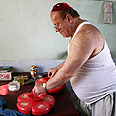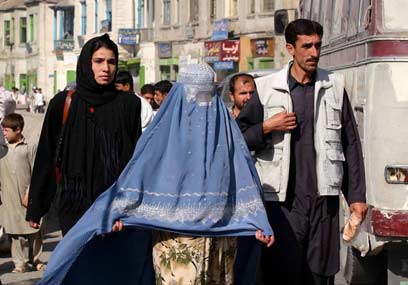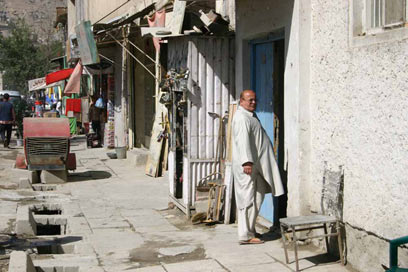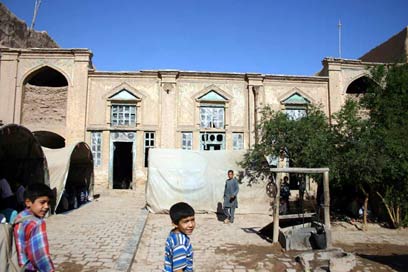
Simantov. Wants money
צילום: צור שיזף
A one-man community
Among dusty alleyways, clay houses, kebab restaurants, and carpeted teahouses, Tzur Sheizaf went to meet the last Jew in Afghanistan. Guess how much it cost him
“Come, I’ll take you,” said the seller in the rug and jewelry store on the end of Flower Street, who led me to the home of the last Jew in Kabul.
It wasn’t hard to find him. He lives right in the center of the city. On Flower Street. Which is called that because there are several florists there. The street is behind a dusty, neglected park in the new city. The continuation is called Hen Street. You’ll see why.
An agent of the Taliban?
We knocked on the iron gate. A bald round head with thick glasses looked out of a window on the second floor. He asked “What is it?” in Dari, the Afghani version of Persian, and my escort told him that there’s a journalist here who wants to meet him. Several minutes passed before he descended the stairs and opened the iron gate. 
Summer in Kabul (Photo: Tzur: Sheizaf)
“Shalom aleichem,” I said. Hebrew in Afghanistan. “Shalom alaichem,” he said in the accent of Jews who speak Dari or Tajik (the Persian of Central Asia). Zevulun Simantov is his name. He wore a white undershirt and looked to be a little over 60. He looked at me with suspicion; perhaps he was calculating what he would get out of me.
He didn’t look Afghani, the last Jew in Afghanistan. I climbed the dark, broken stairs after him to the single room where he lives, in what was once the building of the Jewish school.
Yitzhak Levy lived with him until a few years ago. The quarrels between the two were covered in the world press in 2003 after the United States conquered Afghanistan. The two fought to be the last Jew in the country. Simantov won when Yitzhak Levy died and he was left alone. When Levy was alive the two quarreled, in front of the Americans, over which of them was a Taliban agent and which was their good friend.
Simantov is the custodian of Jewish property in Kabul. In Afghanistan.
“What do you want?”
“To speak to you.”
“And how much are you paying?”
“Paying?”
“You’ll go to your country, write an article, and get money. I want money too.”
In other cases I'd have gotten up and left. Not as a matter of principle. I have no principles. Just because I didn’t particularly like him. But he was the last Jew in Afghanistan, and he knew it. And so did I. He wanted $500. I explained to him that I am a freelance journalist and that we are not funded by the authorities. He agreed to take less. A hundred dollars to sit with the last member of my tribe in Kabul.

Zevulun Simantov. Remained alone (Photo: Tzur Sheizaf)
After receiving the money (he held it up to the sunlight to make sure it was genuine), he went out and brought me what every Afghan serves his guests, even if they don’t pay: a tray with sunflower seeds and pistachios and raisins and almonds. Local hospitality. On the wall were verses and photos of the Lubavitcher Rebbe.
“I have family in Holon,” he said, “a wife and children.”
“And are you going to see them?”
“I went once.”
“And why do you not go to see them?”
“I live here.”
Clearly.
“Will you write in your newspaper that I need help from the government, from the Jews in America, England, and the whole world? That I need money?”
“I’ll tell them.”
“So come and I’ll show you the synagogue.”
Simantov has received a great deal of help, from even more generous Jews who have come to Kabul on various occasions. But the man will not give up his profession in his old age.
We went out to the balcony that surrounded the neglected inner courtyard. The building was in the process of falling apart. Simantov opened the synagogue’s locked door. The hall was deserted. He pointed to the glass cabinets broken by the Taliban and the Torah scrolls that were taken. On the surrounding walls were notices in Hebrew thanking the person who donated a lamp.
From 10,000 to 1
When did Jews arrive in Afghanistan? Legend has it that they came with the Babylonian exile in the time of the Persians. It is said that perhaps there were Jewish soldiers in Alexander the Great’s army. The evidence—monuments on the route from Balh to Termez in Uzbekistan—confirms 900 years of Jewish presence.A hundred years ago there were 10,000 Jews in Herat, Balh, and Kabul. At the beginning of the 20th century they began to emigrate to the Land of Israel. Officially the Jews were permitted to leave between 1950 and 1971. The last Jews left Afghanistan in the 1970s after the communists overthrew the last Khan and took control. When the Russians invaded in 1979 only a few Jews remained, and they left for Uzbekistan, Turkmenistan, and India.

This was once a synagogue (Photo: Tzur Sheizaf)
From a community of hundreds of families in Herat, to which the Jews of Meshad in Persia were exiled when they were forcibly converted to Islam in 1840, not a living soul remained. I was in Herat. In good times there were three synagogues and a bathhouse there. The synagogues have become mosques. The Mula Shmuel Synagogue has become the Islamic school where children skip on the cantor’s bimah locted at the center of the dusty room.
The importance of this period
“Don’t forget to speak with the Jews in England and America!” Simantov reminds me as he accompanies me out to Flower Street and my two Afghani excorts look at him with admiration. In less than an hour he’s earned a sum equal to a monthly salary.There are all kinds of ends to Jewish life in the world, to how the last Jew looks. I met one of them in Calcutta, several in Yemen, in Morocco. But Simantov, unlike the others, was aware of the importance of this time and of his uniqueness (which will pass like everything else), and got as much out of it as he could.










